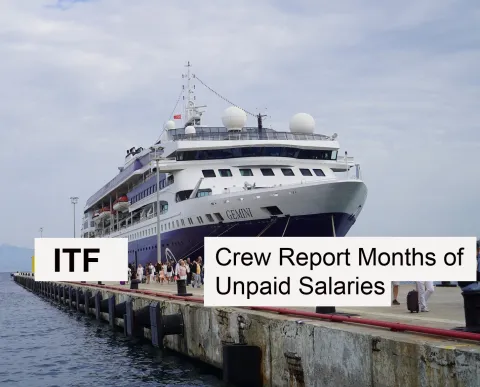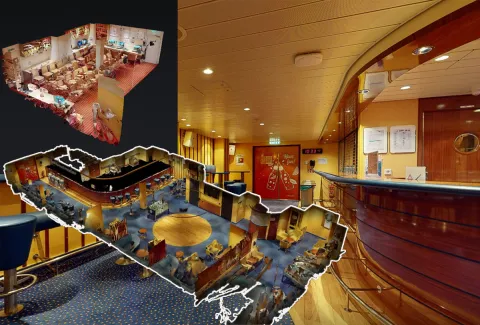
The right attitude can open many doors in your life. It also applies in the cruise ship industry, where I have witnessed that people with a great, positive attitude can progress their careers in a much shorter period.
Sometimes, along the way, I met people with excellent technical skills for the job. They were very good at their work, organized, accurate, and reliable. But then, their attitude towards their colleagues and passengers on board the ship could have been better. In the long run, that was the problem because a lack of a good, positive attitude can usually overmark other qualities of that crew member. In other words, a great attitude is number one to progress on the cruise ship, and probably also in all other areas of life.
Our attitude is what influences all our actions. It is only the right attitude that gets us good results. All the smiles and hand-shakes will not get you far if you do not have the attitude to help others without any selfish expectations. If you expect something in return, it does not help; it is only a favor, and you are only interested in your selfish desires.

It has been said that Opportunity ‘knocks’ at every door. If we utilize it, it leads to success. Otherwise, we just complain about the ‘noise.’ Every problem that we face is nothing but an opportunity to succeed by learning how to conquer it. The better we get at problem-solving, the more successful we are.
The theory is only fully understood by solving problems. One cannot succeed in life with mere theories; it is only the application of theory in overcoming problems that bring the desired results.
To a ‘positive’ person, a problem is a temporary setback and a stepping stone to success. To a ‘negative’ thinker, every problem only confirms his pessimistic view that whatever can go wrong will go wrong. So every problem becomes a stumbling block, with the inevitable result that he/she soon stops progressing. Human nature resists any change. We like to keep within our ‘comfort zone,’ even to the extent of not trying to change a bad habit that we are only too well aware of. However, should one desire to improve, there is o stopping you on your path to success.
Some common Do’s and Don’ts:
Accept Responsibilities. Whether in your job or elsewhere, avoid ‘Passing the Buck.’ By accepting any responsibility, you are actually promoting yourself. Accept responsibility, even for something you have done wrong, and try to analyze and rectify it instead of trying to shrug off the blame. Avoid statements like ‘This place is hopeless’ or ‘This is not my fault.’

Create the Right Attitude. Everyone in your team must benefit so that the whole group gains. Everyone stands to gain, as you reap more benefits from the combined efforts than from just trying to be a ‘loner.’ This is called having Team Spirit. Many people have a Win – Lose attitude. They feel that it is right to gain something extra, even at the expense of everyone else in their group, who must ‘lose.’ This leads to a Lose–Lose situation, where everyone on the team ends up with some loss.
Have consideration for the other person, and you will receive the same consideration, from others, in return. Give others the same treatment that you would like to receive from them. Be tactful. Avoid unnecessarily hurting any person’s sentiments by undue harshness. Some people brag about being ‘brutally honest.’ They take more pleasure in the brutality than in the honesty. You can be sure that your ‘brutality’ recipient will leave no stone unturned in returning you the same treatment (with interest).
Avoid criticism, especially in public. It is very easy to criticize but difficult to undo the damage due to negative criticism. Negative criticism almost always makes the person justify his wrong action rather than remedy the situation. Make the person aware of his drawbacks indirectly so that he will correct the fault himself. Correcting a fault is the desired outcome, not ‘hanging’ the person for his alleged ‘crime.’ Although a person doing a ‘wrong’ action needs to be corrected, it is the action that is ‘wrong,’ not the person.
Be positive in your interpretation of another person’s actions. Don’t get paranoid and expect the worst. It is always better to give a person the benefit of the doubt. Even in a court of law, nobody is declared a criminal until proven. Unfounded suspicions are worse than hanging a person.
Empathy is the key to the cruise industry.
Be an Empathic listener. Seek to understand what the other person is trying to communicate with an open mind. Do not try to dominate his talk or judge him with your own myopic or prejudiced views of the situation.
Be enthusiastic in whatever you do. Enthusiasm is ‘infectious,’ i.e., it fires up the whole team to perform better. The only difference between a successful team and any other team is a little extra effort, which is possible only if there is an enthusiastic approach.
Give honest and sincere appreciation whenever a person deserves this. This is separate from flattery, which shows up the lack of character of the Flatterer. A Flatterer almost always has an ulterior motive behind his flattery, usually only for his own benefit. However, other things being equal, it is far better to suffer a Flatterer than to be stuck with an ungrateful person who does not ever appreciate anything, much less ever praise anyone. An ungrateful person displays a total lack of leadership qualities.
The moment someone points out any of your mistakes, it is better to accept them graciously instead of launching diversionary tactics to shift the blame elsewhere or deny something totally. However, you must take care not to repeat the same mistake. To make a mistake once is human; to repeat it many times is sheer carelessness and not pardonable. Accept the mistakes of another without humiliating him publicly, and rejoice in the success of his efforts to correct it. Congratulate the person when he corrects the mistake, with the same constancy, as when you pointed out his mistake. You must always be fair in your dealings.
Don’t get unnecessarily involved in Arguments. They achieve nothing. Neither side knows the facts. If they did, why would they argue? Nor are the arguers interested in knowing any facts. To an Arguer, who is right is more important than what is right. An argument is an emotional affair. When viewed logically, it is a complete waste of time, as there are no tangible benefits. Neither side is open to the point of view of the other. There is nothing to be learned from it, as neither side works systematically. The only way to get the best out of an argument is to avoid it or decline to participate. Arguments leave you frustrated and emotionally charged, without achieving any objective, of putting up your point of view.
Crew Insights
Articles and experiences shared by crew members working on cruise ship. Find out more about ship life at sea together with tips and advices for first time crew members and cruise oldtimers.












